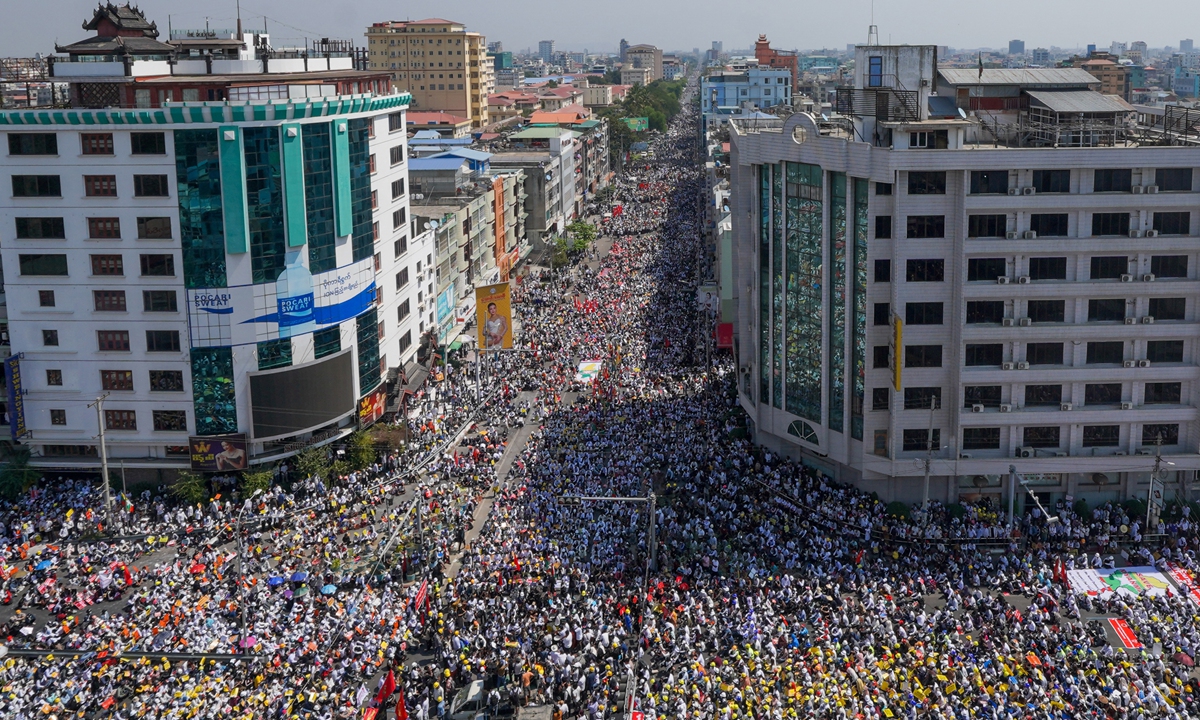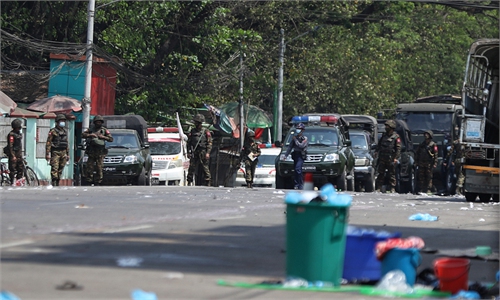Exclusive: Chinese enterprises in Myanmar receive no order to evacuate after attacks, deny such reports

Protesters take part in a demonstration against the military upheaval in Mandalay, Myanmar on Monday. Photo: AFP
"We have not received any official instructions to evacuate," multiple sources with China's state-owned enterprises operating in Myanmar confirmed with the Global Times on Wednesday, denying reports that China had ordered Chinese firms to pull out non-essential staff from Myanmar, which has been mired in a political crisis since February.Employees with a number of major Chinese state-owned firms in Myanmar including the State Power Investment Corporation Group, China National Petroleum Corporation, and China Unicom approached by the Global Times on Wednesday all denied the existence of such an arrangement, which the Hong Kong-based South China Morning Post (SCMP) reported Tuesday calling it a clear instruction directly issued by the State Council's State-owned Assets Supervision and Administration Commission (SASAC).
The SCMP report came after at least 32 Chinese-invested factories in an industrial zone in Myanmar's commercial capital Yangon were vandalized in attacks on Monday. The Chinese Embassy in Myanmar told the Global Times exclusively that the attacks resulted in property losses of 240 million yuan ($36.89 million) and the injuries of two Chinese employees with no fatalities.
Evacuation from Myanmar was only mentioned in a piece of safety advice from the International SOS which began circulating among Chinese firms after the Monday attacks, a source with a Chinese state-owned company working on an infrastructure project in Yangon, told the Global Times on Wednesday.
The Singapore-headquartered International SOS is a health and security services firm that counts nearly two-thirds of Fortune Global 500 companies as clients, according to the firm's official website.
The International SOS suggested in the safety advice all client employees in the country minimize non-essential movement, and upgraded its warning level from "standby" to "evacuation."
The advice did not single out Chinese state firms, although the Monday attacks in the Yangon industry zone were indeed mentioned in the document, highlighting the tense situation.
Commenting on the SCMP report, the Chinese firm employee said he suspected that the Hong Kong news service could have mistaken the SOS advice for a SASAC instruction, pointing out that the advice had been shared among not only Chinese firms but also with clients from other nations.
Many companies are working on drafting emergency response schemes, and evacuation might be among one of the many options, sources told the Global Times. "If there is anything related to the evacuation for now, it is within company-level talks."
Myanmar sent additional police and firefighters to the affected area in Yangon to strengthen security, said Chinese Foreign Ministry spokesperson Zhao Lijian at a press conference Monday.
When asked if China will evacuate its nationals in Myanmar, Zhao reiterated on Wednesday that China is closely following the situation and is very concerned about the safety of Chinese institutions and personnel. China hopes Myanmar will take measures to protect their safety, he said.
A representative of Chinese enterprises in Myanmar also told the Global Times on Wednesday that he had not received any notice about staff evacuation from the authority. However, given the situation in Myanmar, some companies are considering returning to China as one of the options, he said.
In fact, some Chinese staff in Myanmar have already returned to China several weeks ago due to the recent social turmoil, according to a manager with a Chinese SOE in the hydropower sector. They told the Global Times that the company's project in Myanmar is on standby, but some staff will remain in Myanmar, where the company has a representative office.
The representative, who asked not to be named, said that the leader of the Hlaing Thar Yar industrial zone has promised to strengthen protection of Chinese companies and increase police forces in the area, following Tuesday talks with some Chinese representatives.
However, this development was not enough to make Chinese people there feel assured about their safety. "We still have to rely on ourselves, because if an incident occurs, it takes at least half an hour for military personnel and police to arrive and help," he said.

